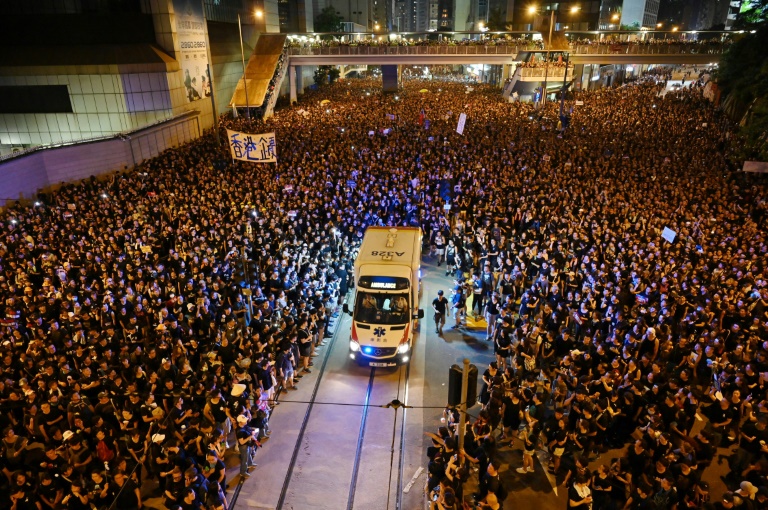About two million protesters choked Hong Kong’s streets in a powerful rebuke of a reviled extradition law, organisers said Sunday, piling pressure on the city’s embattled pro-Beijing leader who apologised for causing conflict but refused to step down.

Crowds of protesters were still camped out in parts of Hong Kong as night fell |
AFP / HECTOR RETAMAL
The show of force saw vast crowds marching for hours in tropical heat, calling for the resignation of chief executive Carrie Lam, who was forced to suspend the bill as public anger mounted.
Throngs of largely black-clad protesters snaked their way for miles through the streets to the city’s parliament — with the organisers’ estimate for the crowd size doubling an already record-breaking demonstration the previous Sunday in the city of 7.3 million.
The estimate has not been independently verified but if confirmed it would be the largest demonstration in Hong Kong’s history.
Hong Kong’s biggest protest to date was a massive rally in support of Tiananmen protesters in May 1989, before Beijing’s deadly crackdown, which sources at the time put at roughly 1.5 million strong.
Police, who historically give far lower estimates for political protests, said 338,000 people turned out at the demonstration’s peak Sunday.
Many accused the police of using excessive force, and anger was further fanned by authorities calling the largely young protesters rioters.
Nearly 80 people were injured in the unrest — including 22 police officers — with both sides showing a willingness to escalate action and reaction to levels unseen in the usually stable business hub.
Police said they had no choice but to use force to meet violent protesters who besieged their lines outside the city’s parliament.
But critics — including legal and rights groups — say officers used the violent actions of a tiny group of protesters as an excuse to unleash a sweeping crackdown on the predominantly young, peaceful crowd.
One man died Saturday when he fell from a building where he had been holding an hours-long anti-extradition protest.
He had unfurled a banner on scaffolding attached to an upscale mall, but fell when rescuers tried to haul him in. Police said they suspected the 35-year-old was suicidal.
Throughout the day, demonstrators queued for hours to leave flowers and tributes where he fell.
Battling for the city’s soul
The extradition furore is just the latest chapter in what many see as a battle for the soul of Hong Kong.
For the last decade the city has been convulsed by political turbulence between pro-Beijing authorities and opponents who fear an increasingly assertive China is stamping on the city’s unique freedoms and culture enjoyed since the handover from Britain in 1997.
Opposition to the extradition bill has united an unusually wide cross-section of Hong Kong, from influential legal and business bodies to religious leaders.
Lam’s decision to ignore those warnings and press ahead with the bill even after last weekend’s massive rally placed her administration under pressure from both opponents and allies.
Advisers and pro-establishment lawmakers urged her to delay the bill after Wednesday’s violence, while Beijing began to distance itself from her administration.
Her climbdown is a rare example of the city’s unelected leaders caving-in to demonstrations — something more recent administrations have been increasingly unwilling to do.
Two months of protests in 2014 calling for the right to directly elect Hong Kong’s leader won no concessions from Beijing, and key figures from that movement are now in jail.
One of that movement’s most prominent leaders, 22-year-old activist Joshua Wong, is due to be released from prison on Monday morning, his party said late Sunday.
It was not clear whether his early release was a gesture from the authorities or merely typical procedure under provisions for good behaviour.
She has lost the public
Her response is purely a PR strategy, 20-year-old protester Vivian Liu told AFP after Lam’s statement. And to define our protests as a riot is totally inappropriate.
Personally I think she can no longer govern Hong Kong, she has lost the public, added Dave Wong, a 38-year-old protester who works in finance.
In mainland China, the internet was scrubbed clean of references to the massive rally, with entries for Hong Kong on search engines and social media platforms showing no sign of the demonstration.
The latest protest did not, however, go unnoticed in Washington, where Secretary of State Mike Pompeo said President Donald Trump would discuss the events with his Chinese counterpart Xi Jinping at the G20 summit later this month.
We are watching the people of Hong Kong speak about the things they value, Pompeo said.





